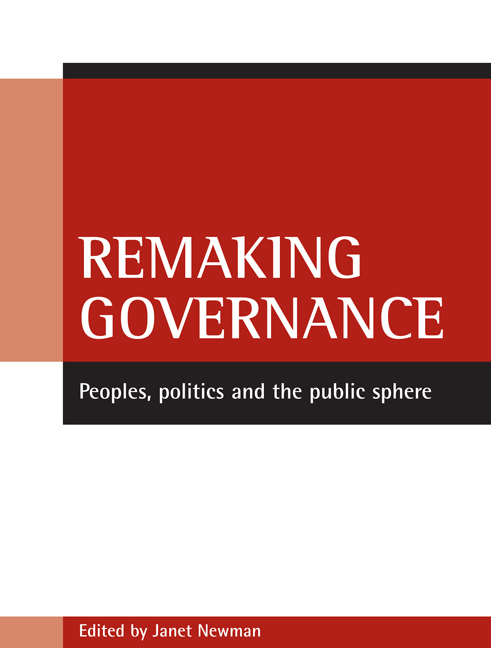Book contents
- Frontmatter
- Contents
- List of tables and figures
- Acknowledgements
- Notes on contributors
- Introduction
- one Reconstituting Europe: governing a European people?
- two Governance and the constitution of a European social
- three Remaking European governance: transition, accession and integration
- four Regendering governance
- five Welfare governance and the remaking of citizenship
- six Participative governance and the remaking of the public sphere
- seven Promoting democratic governance through partnerships?
- eight Among everyday makers and expert citizens
- nine Governance and the transformation of political representation
- Conclusion
- Index
eight - Among everyday makers and expert citizens
Published online by Cambridge University Press: 18 January 2022
- Frontmatter
- Contents
- List of tables and figures
- Acknowledgements
- Notes on contributors
- Introduction
- one Reconstituting Europe: governing a European people?
- two Governance and the constitution of a European social
- three Remaking European governance: transition, accession and integration
- four Regendering governance
- five Welfare governance and the remaking of citizenship
- six Participative governance and the remaking of the public sphere
- seven Promoting democratic governance through partnerships?
- eight Among everyday makers and expert citizens
- nine Governance and the transformation of political representation
- Conclusion
- Index
Summary
Introduction
All over the western world we have long been witnessing an individualisation of politics and a decline in the active support and membership of conventional modes of collective political organising through political parties, interest organisations, and (big) voluntary associations (Norris, 1999). Many stories have been written about the decline of civic engagement and the increasing numbers of individuals who are ‘bowling alone’ (Putnam, 1995; Boggs, 1997). Most stories describe how political participation as a collective activity has fallen prey to globalising market forces, transforming virtuous citizens into atomised individuals who are exploiting the state as a means to realise their own interests and values (Putnam, 1993; Braitwaite and Levis, 1998; Mouffe, 2000). Democratic governance, it is said, is undermined by consumer politics and other market-driven oddities such as ‘spin doctors’, fan democracy and celebrity politics (Bennett and Entman, 2001; Corner and Pels, 2003; van Zoonen, 2005). Democracy is making concessions to the market view of citizens as self-interested consumers and customers, who will punish government if it does not deliver the goods that they demand from it. In politics, we are witnessing a profound ‘thinning’ of social and political community, showing “the limitations of the deracinated solitary – he is alone” (Barber, 1998, p 49).
In the modern normative equation of individualisation, more market autonomy-less social solidarity, the many new, more individualised forms of citizenship appear (and must appear) to create a problem of free-riding. This threatens the exercise of ‘strong’ democracy in a normatively well-integrated state and civil society. This idea of common norms as the ‘glue’ of democracy still looms large in most participatory and deliberative approaches to citizenship. The worry is over the ongoing marketisation or individualisation of people in civil society that is said to undermine the pillars of virtuous citizenship, namely that:
(1) citizen activism expresses a collective enterprise for keeping the state accountable to the needs of civil society;
(2) citizen identity is essentially about the creation of strong, affective moral ties to the (national) social community, committing citizens to act normatively, responsibly and in the name of the common will.
This chapter will challenge both of these presumptions (Habermas, 1998).
- Type
- Chapter
- Information
- Remaking GovernancePeoples, Politics and the Public Sphere, pp. 159 - 178Publisher: Bristol University PressPrint publication year: 2005
- 8
- Cited by



